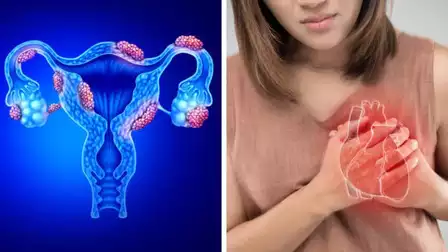Endometriosis is a condition affecting nearly one in every ten women globally. It involves tissue similar to the uterine lining growing outside the uterus, which leads to severe pelvic pain and can cause fertility issues. One major concern with endometriosis is the time it takes for diagnosis. On average, it takes about 6 to 7 years for a woman to be diagnosed with the condition, which makes it harder for women to get the help they need and leads to prolonged suffering.
The Impact of Endometriosis on Hormones and Heart Health
Endometriosis not only affects a woman’s reproductive health but can also raise the risk of heart disease. A key part of this is the hormone imbalance caused by endometriosis. The hypothalamus in the brain produces a hormone known as GnRH (Gonadotropin-releasing hormone) which signals the pituitary gland to release other important hormones like FSH (Follicle-stimulating hormone) and LH (Luteinizing hormone). These hormones regulate the ovaries, where estrogen and progesterone are produced.
Estrogen plays a vital role in protecting the cardiovascular system by helping to maintain healthy blood vessels, prevent plaque buildup in arteries, and regulate cholesterol levels. Progesterone balances the effects of estrogen, contributing to overall heart health. However, when endometriosis affects the ovaries, it disrupts the production of these hormones, particularly estrogen and progesterone. This disruption impacts the protective effects these hormones have on the heart, leaving women more vulnerable to heart disease.
Increased Risk of Heart Disease in Women with Endometriosis
Research has highlighted the direct link between endometriosis and heart disease. A study analyzing health data from a large population showed that women with endometriosis had a higher likelihood of being hospitalized for heart conditions such as heart attacks, strokes, and heart failure. This finding emphasizes the importance of understanding the broader health risks associated with endometriosis.
Managing Endometriosis to Support Heart Health
Endometriosis often affects women in their 30s and 40s, with some experiencing menopause at later ages. Managing this condition involves a combination of treatments, including hormonal therapies, pain management, and sometimes surgery. Additionally, lifestyle changes such as maintaining a balanced diet, engaging in regular physical activity, and managing stress can help mitigate the risks associated with both endometriosis and heart disease. Regular check-ups with healthcare providers are crucial to monitor both reproductive health and cardiovascular risks.
Raising Awareness for Better Health
Left untreated, endometriosis can severely impact a woman’s health by damaging blood vessels and increasing the risk of serious cardiovascular issues. Educating the public about this condition and its connection to heart disease is key to improving women’s overall health and quality of life.
Conclusion
Endometriosis can have far-reaching effects on both reproductive and heart health, making it important for women to understand the risks involved. Early diagnosis and the right treatment can help manage the condition, reducing the chances of complications like infertility and heart disease. It’s essential for women with endometriosis to work with healthcare professionals to tailor their treatment and take proactive steps to protect their heart health.
Important Note:
Before making any significant changes to your health, it is always advisable to consult with your doctor or healthcare professional. They can offer personalized guidance based on your medical history and current health condition.
For any health-related concerns, please contact us at +91-9058577992 to receive a free consultation from our experienced doctors. Your health is our top priority. Thank you.


